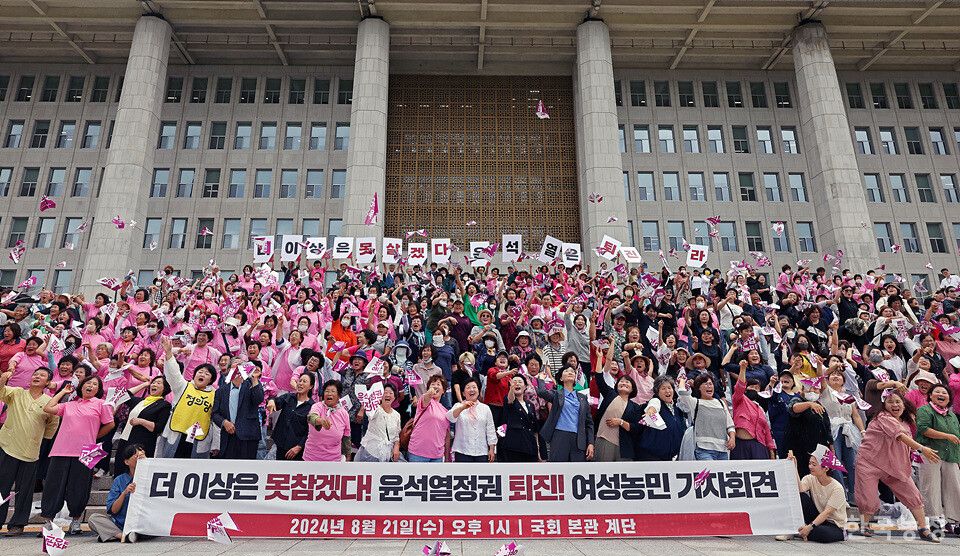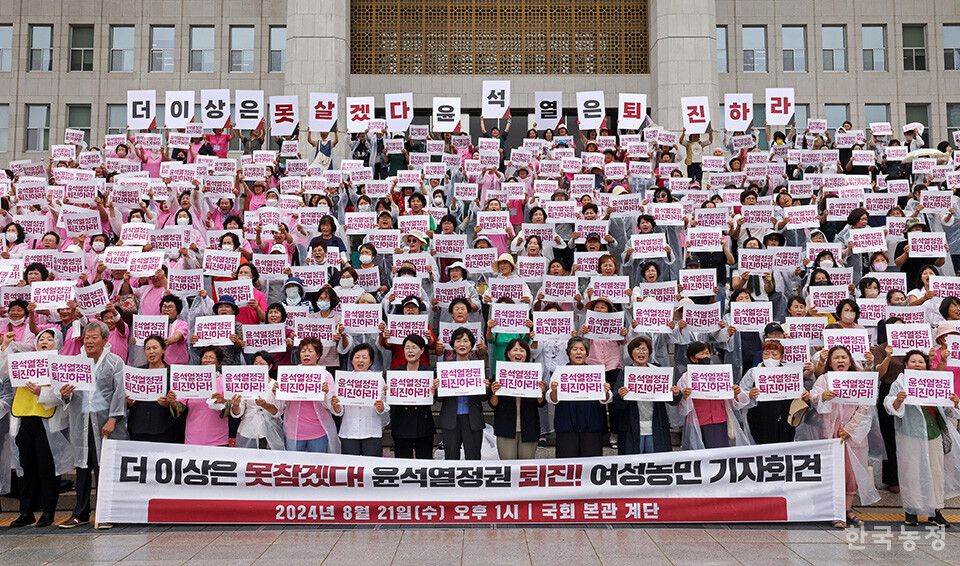South Korea: Faced with Climate Crisis, Peasant Women Protest Corporate-Oriented Farming Policies and Food Imports

On August 21st, more than 600 peasant women gathered at the National Assembly in Seoul to voice their concerns to the government about agricultural policies related to climate disasters. The government’s corporate-oriented farming policies, which worsen the climate crisis, and its focus on imported agricultural products are causing increasing despair among peasant farmers.
From late last year to early this year, higher-than-usual winter temperatures, frequent rainfall, and a lack of sunlight have led to various crop diseases and pests. The wet and cold conditions have been particularly severe, and in July, heavy rainfall caused flooding in some areas, devastating homes, rice paddies, and fields.
Speaking to IKP News, Yang Ok-hee, chair of the Korean Women Peasants’ Association (KWPA), stated, “Our peasant farmers have been hanging on by a thread for a long time. The word ‘difficult’ has become a cliché. Farmers’ incomes hit new lows every year, and the number of peasants continues to decline, predicted to fall below 2 million in a few years. Agricultural product prices fluctuate wildly due to repeated climate disasters, and the government’s only solution is to import agricultural products.”
Kwon Tae-ok, chair of the KWPA’s Chungnam chapter, said, “In Nonsan, where I farm, we suffered flood damage again this year, just like last year, and this year’s farming is uncertain. This country doesn’t care at all what happens to agriculture. Without peasant farmers, can we survive solely on imported agricultural products?” She continued, “If peasants don’t produce food, what will the people eat? The lives and future of everyone in this country are in our hands. I want to live in a normal Korea where peasants are treated properly.”
The movements points out that peasants are facing a climate disaster, yet the government’s agricultural policies are moving in the opposite direction from what is needed. The reliance on imported agricultural products, which contribute significantly to carbon emissions, is harming both agriculture and peasant farmers while intensifying the climate crisis.
Despite this, the agricultural budget has remained stagnant at just 2% of the total government budget for the past three years, when it should be increasing. Instead, the government is focusing on food technology, subtropical crop cultivation and distribution, smart farms, and ‘corporate-centered farming’ policies that fail to address the realities peasants face.
So, what policy directions can help overcome climate disasters?
The KWPA and other peasant movements insist on fundamental measures based on accurate surveys to prevent such disasters. They demand that policies shift away from reliance on carbon-emitting imported agricultural products and corporate-driven farming toward sustainable, food-sovereignty-based agriculture.
These movements also emphasize the importance of establishing a climate change response system that recognizes women peasants as key actors in tackling climate disasters. Women peasants contribute to cooling the earth by cultivating the land and producing food by hand, rather than relying on fossil fuel-intensive farming methods.
The KWPA also points out that women peasants prefer hoes over pesticides and cushions over machines. As small-scale farmers deeply connected to the land, life, and nature, peasant women bear the brunt of climate disasters, and given the small size of their farms, the damage is often felt individually. If there is a need to improve the government’s agricultural disaster preparedness, women peasants should be the first to be consulted, insists the KWPA.
While giant corporations, responsible for high-cost, high-input agriculture and industrial practices, are largely to blame for the climate crisis, women peasants are striving to overcome these challenges by adopting environmentally friendly practices. They are reducing carbon emissions through agroecological methods and using native seeds.
However, women peasants do not yet have legal recognition as farmers. It is essential to amend the Act on Fostering and Supporting Farming and Fishery Businesses to secure co-ownership status, recognizing women peasants as key agricultural contributors. The KWPA also argues that enacting a Basic Farmers’ Act is necessary to ensure farmers’ rights and promote food sovereignty.

This post is also available in Español.
